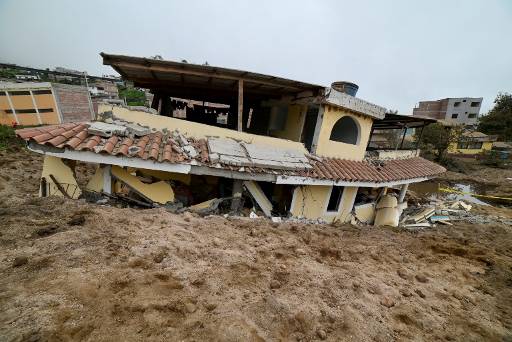
The mudslide happened overnight Sunday into Monday, burying dozens of homes and injuring 23 people in the village of Alausi in Chimborazo province, some 300 kilometers (180 miles) south of Quito, officials said.
Shocked residents, many in tears, stood waiting for news Monday as crews with shovels, pick axes and sniffer dogs dug through the debris to get to survivors stuck between sheets of twisted metal and split tree trunks.
“Five are buried here,” Manuel Upai, a 40-year-old laborer, told AFP, referring to relatives of his as he stared at the muddy ground.
Alausi, a village of some 45,000 people surrounded by green hills, also saw several public buildings hit by the avalanche, which damaged roads and closed three schools.
“I managed to escape with about 15 minutes to spare,” survivor Jose Agualsaca told local TV network Teleamazonas, saying he was rushing to get things out of his house before the mud came.
Ecuadoran President Guillermo Lasso said on Twitter that firefighters from neighboring areas had been rushed to the village to help people affected by the tragedy.
He urged all citizens to evacuate the affected areas.
The government mobilised the national police, armed forces, the health ministry and the Red Cross to help with the rescue efforts.
“We have activated temporary accommodation and mobilized sleeping kits for those that have lost their homes,” said a government statement on Twitter.
– Landslides, floods –
Since the start of the year, heavy rains in Ecuador have caused the deaths of 22 people, destroyed 72 homes and damaged more than 6,900 residences, according to the SNGR risk management secretariat.
The downpours have caused close to 1,000 dangerous events, such as landslides and flooding.
The area affected by Sunday’s disaster had been in a designated yellow alert risk zone since February following other landslides.
Sunday’s landslide came just over a week after 15 people were killed when a strong quake struck in Ecuador’s southwestern border region with Peru.
The earthquake, registered at a magnitude of 6.5 by local authorities, caused 22 landslides that blocked roads in the provinces of El Oro and Azuay.
Afterward, the government declared a two-month state of emergency in 13 of the country’s 24 provinces, allowing economic resources to be redistributed to affected areas.
In February, heavy rains forced oil pumping in the country to be suspended for five days for safety checks over fears that a major oil pipeline could have been damaged by the collapse of a bridge.
Ecuador’s Andean valleys can have a rainy season that lasts from October until May.











